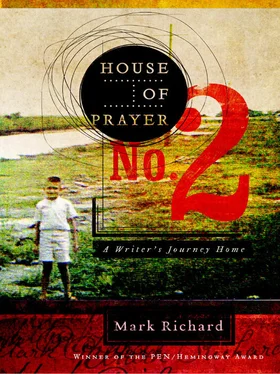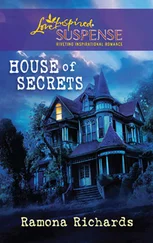Everyone wishes the barbers came every week like the practice preachers but the barbers do not. The only good thing the practice preachers bring is the pornography, the vivid picture books of martyrs led and bound to rocks where they have their hands chopped off by laughing scoundrels. All the boys like the pictures so much the practice preachers stop bringing them. The practice preachers can’t stand how you all laugh at the guys with the chopped-off hands, the way they sit with their faces turned up toward the clouds, blood gushing from their bloody stumps like broken red pipes, their hangdog tongues, their mangy shoulder-length hair, their eyes staring stupidly into heaven.

YOUR FATHER IS COMING for you in a station wagon, the head nurse says. You say goodbye to Nurse Wilfong, who bathes you every day, you say goodbye to Big Mike, the boy with the melted face, and give him your transistor radio. You give your best friend, Michael Christian, the black boy in perpetual leg braces, all of your contraband—an old Christmas tin of stale pretzels and the rubber-band slingshot metal-tipped balsa jets some Shriners had handed out and were confiscated after everyone shot them stuck into the acoustic tile ceiling. You give the Human Skeleton a tin metal truck and the little daredevil figure that shot out of the Cracker Jack box prize cannon. He breaks it the first time he fires it. You write a note to the girl on the girls’ ward you talked to on the lawn when Hogan’s Heroes came, Colonel Klink telling you he had a son named Mark. You tell the girl you’re sorry, it’s over, you’re going home. The young nurse who had passed all the notes back and forth reads it and laughs and throws it away. You say goodbye to Ben the porter, who always gave you a pony blanket at nap time that didn’t smell like diarrhea and who always saved you a little paper cup of pineapple juice when nap time was over. You say goodbye to Jerry, who now doesn’t have any legs at all.
Two hours home, everything recedes through the back station wagon window, you in your body cast on a pallet of old blankets—Richmond, the cigarette factories, the signs to the Crater, then the plank road, the fields of peanut stacks, and the dark alleys of swamp road. A man from your father’s work, a man who survived Omaha Beach when ninety-eight percent of his company did not, who loses his only son to a tiny complication in a minor surgery, helps your father lift you from the back of the station wagon. The man from your father’s work carries you like a piece of precious furniture he is afraid to break, into your house, tilting you at the door because your plastered legs are cast too wide, and you momentarily grasp the old brass door knocker etched with the name of the family who had lived there long before your family, Livesay.
Your father has rented a hospital bed and pushed it against the window of a downstairs bedroom no one sleeps in. It is Indian summer and still hot and your house does not have air-conditioning. The cotton in your cast is hot and your legs itch and you wonder if the little things you feel down in the plaster that you can’t reach with an unbent coat hanger are trickling sweat or something nesting like the things they found in the kid from Appalachia’s cast when they cut it off. You know you smell bad, and sometimes your mother walks through waving a cloud of disinfectant spray in the air, looking at the ceiling as if that is where the smell is coming from and not from you.
You don’t want visitors and your best friend, David, understands this and he and his dog Wolf come and talk to you through the window screen. David is The Preacher down the street’s third son of four, you’d been warned away from him by the lady next door the day you moved in. He’s trouble, the lady’d said. She said you ought to just play with her son Jim. When redheaded David came around your backyard that first afternoon to steal your moving crates and boxes, you became best friends to this day, fifty years running. Sometimes Wolf, the large blue collie, sleeps in the shrubbery under your window, you can hear his tags clink in the evenings as he settles in, he’s a good dog. The clinking of his tags always calms you. He had slept there many nights the two summers before when David came over and you two played a Monopoly game that you made last from Memorial Day until Labor Day, sheaves of wide-ruled paper documenting the moves of phantom players, the building of triple hotels, and alternating ownership of the bank.
Your mother has your baby sister to tend to and she has you. You have to teach your mother how to bathe you, how to empty a bedpan, when to bring a urinal, how to help you flip over so she can change your sheets. Your father doesn’t come into your room much. No one is happy except your baby sister when they lift her into the playpen of your hospital bed and she crawls all over you and sits beside your head and laughs while she slaps your face and you let her.
There are two positions in the body cast, faceup and facedown. From either position you can watch your street go by. There is Augie who lives in the maid’s house across the street. He gets up at dawn to drive by the cemetery to check the lights on the radio tower before driving to the little studio in the low-end strip mall on the river to warm up the transmitter. In those days he is the voice of the town, and everyone listens to his morning show—the news, the weather, the twenty-year-old songs, the birthdays and anniversaries, the lost and found, the church supper announcements. Be Still and Know , the inspirational program with the church organ lead-in, the sports scores, the gentle chiding of the town elders when they needed it, the dedications of songs when someone needed it, the remembrances of the people who needed remembering, and the marathon fund-raising in the window of the Chevrolet dealership owned by the man whose wife taught Sunday school and was a member of the Hitler Youth, the fund-raising for the star football player who’d fallen from a tree retrieving a shot squirrel and broke his back.
There is the lady walking past who works at the phone company, petite, same sweater, even in summer, purse held tightly almost to her throat, her shoulders lift as she walks as if she is always cold and shivering. Every Sunday night your parents call your mother’s parents down in Louisiana. To make a long-distance call, you have to dial zero and ask an operator for help. There are only a handful of operators, and you recognize their voices, like this lady in the sweater from down the street who lives in the falling-down house next to the Christian church with her four children, an older daughter who is a high school cheerleader, two twin boys who were sometimes left at their grandparents’ house while the mother worked the switchboard, and a little girl. Last winter when the pond where Mrs. Richardson drowned herself froze over, the two twin boys and a friend of theirs from down on the other end of the street took a kickball out on the ice, and they fell through. One of the twins managed to crawl ashore and get help, but by the time everybody got there, there was only the hole in the ice where the two boys disappeared. Nearby, the kickball sat on the ice in the melting sun. They pulled the bodies out, but nobody wanted to go out any farther on the thinning ice to get the kickball. The next day the grandfather went down there with a shotgun and blew the kickball apart, shooting it again and again until it disappeared. Both families moved away, and the church, which owned the falling-down house, tore it down and made it into the parking lot that it is to this day.
Once, listening in on the extension phone when your parents call Louisiana and the operator is the lady who has lost her child, you can hear the sad story in her voice even when she only says You are connected , and then your grandfather answers the phone Allô? and your mother says Comme c’est va, cha? and your grandfather, who misses your mother, who is his eldest daughter who is so far away and who has lost her faith, you can hear in his low voice that he will not be putting your grandmother on the line as he says Pas mal, not bad, chérie, not bad. Et tu? And then you faintly hear someone crying on the line somewhere, and you don’t know if it is your mother knowing her mother has not forgiven her or if it is the lady from down the street listening in, her operator’s mouthpiece in a tight little first clenched against her sweatered shivering breast.
Читать дальше













